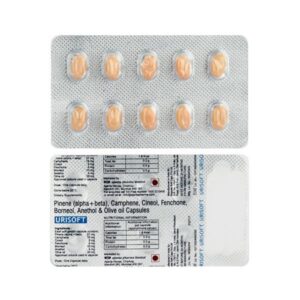OLIVE OIL + FLAVOXATE HYDROCHLORIDE
Olive Oil: Drug Name: Olive Oil
Use: Olive oil is primarily used as a dietary supplement and a cooking oil. It is a popular choice due to its potential health benefits.
Mechanism of Action: Olive oil is composed mainly of monounsaturated fats, specifically oleic acid. It also contains phenolic compounds and other antioxidants. These components are thought to contribute to the potential health benefits of olive oil, including its positive effects on cardiovascular health and inflammation.
Dose: The recommended dose of olive oil varies depending on the desired effect. When used as a dietary supplement, it is generally recommended to consume 1-2 tablespoons (15-30ml) daily. As a cooking oil, it can be used in varying quantities as per the recipe.
Side Effects: Olive oil is generally considered safe for most individuals when consumed in moderation. However, some potential side effects may include:
1. Upset Stomach: Excessive consumption of olive oil may cause symptoms like diarrhea, nausea, or indigestion in some individuals.
2. Weight Gain: Olive oil is high in calories and fat, so excessive consumption may lead to weight gain if not balanced with an appropriate diet and exercise.
3. Allergic Reactions: Although rare, some individuals may be allergic to olive oil and may experience symptoms like rash, itching, or difficulty breathing.
4. Interference with Medications: High doses of olive oil may interfere with the absorption of certain medications, especially those that require fat for absorption. It is advised to consult a healthcare professional if taking any specific medications.
Note: It is important to choose high-quality and extra virgin olive oil, as it undergoes minimal processing and retains more beneficial components compared to other types of olive oil. Additionally, it is always recommended to consult a healthcare professional or a registered dietitian before making significant changes to your diet or adding a dietary supplement.
Flavoxate Hydrochloride: Flavoxate Hydrochloride is a medication used to relieve urinary bladder spasms. It is primarily prescribed to treat conditions such as bladder pain, urinary urgency, and frequent urination.
The mechanism of action of Flavoxate Hydrochloride is not fully understood. However, it is believed to exert antispasmodic effects on the smooth muscle of the bladder. It is thought to inhibit the binding of acetylcholine to its receptors, thereby reducing muscle contractions and relieving bladder spasms.
The usual recommended dose of Flavoxate Hydrochloride for adults is 100 to 200 mg three to four times a day. It is typically taken with or immediately after meals. The dosage may vary depending on the individual’s condition and response to treatment. It is important to follow the instructions provided by the healthcare provider and not exceed the prescribed dose.
Some common side effects of Flavoxate Hydrochloride may include dry mouth, dry eyes, blurred vision, drowsiness, dizziness, headache, and upset stomach. These side effects are usually mild and temporary. However, if they persist or worsen, it is important to consult a healthcare professional.
Flavoxate Hydrochloride may also cause rare but more severe side effects such as difficulty urinating, increased heart rate, confusion, hallucinations, and allergic reactions. If any of these symptoms occur, immediate medical attention should be sought.
It is important to note that Flavoxate Hydrochloride should not be used in certain situations, such as in people with glaucoma, urinary or gastric obstruction, myasthenia gravis, or those who have shown hypersensitivity to the drug.
As with any medication, it is important to consult a healthcare professional before starting Flavoxate Hydrochloride to ensure it is suitable for your specific condition and to discuss potential interactions with other medications you may be taking.

